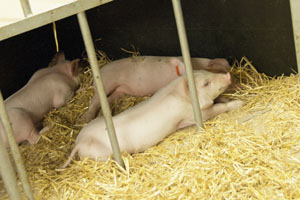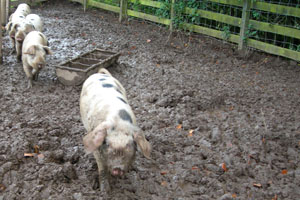Improving sow and piglet welfare
Published on 25 June 2011 in Food, health and wellbeing
SRUC (formerly SAC) research on birthing (farrowing) sows and newborn piglet survival has provided major contributions to improved animal welfare, economics, housing design, EU legislation and guidelines for keeping pigs. Our research was the first to identify that sows housed in restrictive systems suffer impaired welfare. It also found it is possible to breed for improved piglet survival in free farrowing systems – trials improved survival by 3% in a generation. A new free farrowing system has been developed to meets the needs of the sow, the piglet and the farmer.

Key Challenges
The use of the farrowing crate system, designed to minimise space requirements, protect piglets and make handling of sows easier, has led to a controversial welfare dilemma. The sow, during the pre-farrowing period, is highly motivated to build a nest in preparation for birth. The restrictive nature of the farrowing crate thwarts this behaviour. However, the farrowing crate, through restricting movement by the sow, provides protection for the piglets from crushing. The challenges are to improve piglet survival and to design a welfare friendly system which optimises economic performance.
Key Benefits
SRUC’s work on piglet survival and tackling controversial housing systems has key animal welfare, economic and social benefits. Pre-weaning mortality rates currently range from 16-20% - approximately two million piglets each year in the UK. Aside from the welfare issues, this represents a significant economic loss to the UK pig industry – potentially £22 million net profit a year (2010 figures). It is therefore vital to identify and avoid the causes of piglet mortality in different farrowing systems.
SRUC has investigated the causes of piglet mortality in free farrowing systems and, in collaboration with commercial breeding companies, investigated the genetics of piglet survival within such systems. The work identified that it is possible to breed for improved piglet survival in free farrowing systems and, in SRUC’s trials, piglet survival was improved by 3% within one generation. SRUC’s close collaboration with commercial breeding companies means this information is readily available to industry. If applied at a national level it could equate to 60,000 fewer piglet deaths and a potential improvement in net profit of over half a million pounds per year (2010 figures).
This research has culminated in the development of an alternative free farrowing system called PigSAFE (Piglet and Sow Alternative Farrowing Environment). Funded by Defra and in collaboration with the University of Newcastle, PigSAFE optimises the needs of the sow, piglet and the farmer.
“SRUC research found it is possible to breed for improved piglet survival in free farrowing systems – in trials, piglet survival was improved by 3% within one generation.”
Providing practical, science-based information on piglet survival, sow welfare and the issues surrounding development of farrowing systems to the industry has been an integral part of the research. This has involved farmer discussion groups, workshops, publications and online material. New scientific information has been disseminated through peer review papers and scientific European and International workshops and conferences. There is considerable interest from large retailers and farmers. Systems are currently being installed in the UK and Australia, representing the first major commercial uptake of a completely non-crate system in countries where farrowing crates are still permitted.
In addition, the success of PigSAFE to date has influenced the RSPCA Freedom Foods guideline to phase out the use of the farrowing crate.


Comments or Questions
Related Websites
Our Partners
As well as Scottish Government support, our research has been funded by Defra, the BBSRC and the European Union. Close collaborations exist with Newcastle University and Edinburgh University.
Find Out More
For more information contact Dr Emma Baxter, Emma.Baxter@sruc.ac.ukAuthor
Dr Emma Baxter Emma.Baxter@sruc.ac.uk







